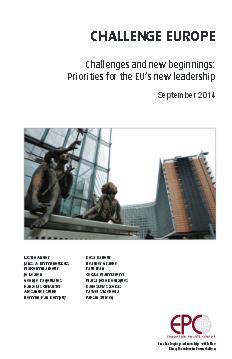European Policy Centre (2014) “Challenges and New Beginnings: Priorities for the EU’s New Leadership, Challenge Europe, Issue 22, Σεπτέμβριος.
Foreword
There has been a lot of attention on the current transition of power taking place in Brussels. For the first time in European Union history, the new President of the European Commission will take up his post after being nominated as ‘Spitzenkandidat’ of the party group which gained the highest share of votes in the EP elections. The new President of the European Council and new High Representative have been selected; the (controversial) structure of the new Commission has been announced, together with the list of Commissioner-designates; and the new Members of the European Parliament, elected in May, have started working, now scrutinising the potential new Commissioners in their hearings.
There is no better moment to take stock of the ‘state of the Union’ and to look ahead into the next European political cycle (2014-2019), focusing not on personalities but on content: what challenges do we face and what should the EU focus on in the coming years?
Europe’s experience of recent years has been one of multiple and inter-related crises, triggered by the global financial crisis, including financial/banking, public debt, euro, economic, social, and political crises. In addition, we now face uncertainty over the continued membership of the United Kingdom and an external crisis, with potentially large impact on the EU, especially in those countries with high energy dependency.
These crises, and the difficulties in addressing them, have heightened the legitimacy deficit that has been affecting the European Union for the last decades and has given new life to Eurosceptic and populist movements. The fundamentals of the European project, such as the free movement of EU citizens, are starting to be challenged even by mainstream European parties, while the debate on repatriation of powers and the balance between Member States’ and EU competences is growing.
Thus, it is clear that in the next five years this new political leadership will be faced with a multitude of challenges. The list of immediate priorities is long: fostering growth, creating jobs, overcoming internal fragmentation, establishing an Energy Union, dealing with problematic neighbours, finding a way forward on the UK issue and completing the missing elements of EMU governance. Europe also needs to find ways to overcome its legitimacy deficit and come up with a shared vision for Europe’s future.
This issue of Challenge Europe aims to contribute to this debate about the future of European integration in view of the next political cycle, the challenges it faces and the possible solutions, considering also their implication for the way the institutions organise their work. This is done through a series of articles authored by distinguished contributors, almost all of whom are or have been involved in high-level EU policymaking and policy analysis, either at the European or the Member State level.
The first article of this volume addresses the state of the Union at the start of the new political mandate, followed by an analysis of the three meta-challenges faced by the EU: stagnation, fragmentation and legitimacy. The following articles deal with these challenges across a large breadth of policy areas, from EU and euro governance to differentiated integration, growth, solidarity, climate change, EU foreign policy, migration and the freedom of movement of persons, leadership, and populism.
I would like to thank the authors for accepting our invitation and putting their ideas on paper and the EPC staff, for helping prepare this publication, in particular Paul Ivan as coordinator of the process. I believe that this volume is an important contribution to the current policy debate, providing analysis combined with concrete recommendations. We hope this publication will not only be useful, relevant and timely, but that it will be a starting point for further debate.
Σχετικές αναρτήσεις:
- Véron, Ν. (2014) “Euro crisis turning point: Two years of Banking Union – Europe’s leaders avoided their usual muddling-through complacency to do something radical—and it worked!“, Bruegel Institute, 30 Ιουνίου.
- Palmer, J. (2014) “After The European Elections – How Will The EU Leadership Respond?“, Social Europe Journal, 27 Μαΐου.
- Issing, O. (2014) “The German Leadership Question”, Project Syndicate, 14 Απριλίου.




